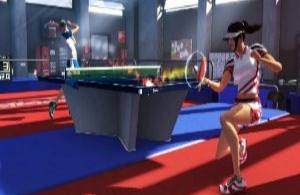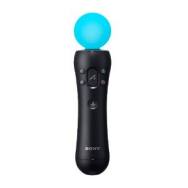| |
 PlayStation
Move (PS3) PlayStation
Move (PS3)
Sony’s heavily-advertised attempt to bring
motion control gaming to the PS3 is here in the form of Playstation Move.
The new wand controller and its accompanying camera work decently for what
they are. The Move system offers increased accuracy over what you can find
in most Wii titles and is relatively simple to set up and use.
Unfortunately, the software, at least initially isn’t quite as
innovative. Playing through the launch title Sports Champions brings on a
strong sense of déjà vu. It offers multiple ‘events’ but it will be
difficult for most players not to feel like they’ve seen this before.
However, it’s a only the beginning for the Move, so join us as we look
at the new controller and discover if it lives up to the hype.
|
It's been a long four years for Microsoft
and Sony. The launch of Nintendo's Wii system and its revolutionary motion
controls set the industry on its ear and it's taken quite some time for
both companies to respond. Microsoft's hands-free Kinect is due later this
year, but Sony has recently launched its own motion control system, called
the Move. Consisting of a repurposed EyeToy camera and a new motion
controller, the two part peripheral isn't that difficult to set up and
use. Positioning the camera on top or bottom of your monitor and standing
a few feet in front of it makes for a somewhat painless experience. Most
games have you configure and calibrate the Move system by standing in
front of the monitor then placing the wand controller at different points
on your body. This only takes a few seconds when it works, but the Move is
a little bit erratic when it comes to recognizing your position, which
means you might have to try multiple times and move in different positions
in order to sync the controller to the camera. Move's controller itself is
nicely designed, and its rounded edges and slimmer size make it modestly
more comfortable to use than the standard Wii controller. It also has more
buttons including all the standard PS ones plus a large move button in the
center. The most striking feature of the new controller is the large ball
on top of it, which glows in different colors and allows the camera to
track your position. This makes for a controller that's nearly as
intuitive and 'user friendly' as the Wiimote, but it feels a little more
complex at first glance. Its technically impressive and very accurate when
in use. However, tracking isn't always quite as precise as one would like.
We came across several instances where there would be some lag, and the
camera's limited range means you'll probably leave its line of sight more
often than you'd like. We have found that playing Move standing up offers
much better performance, and you probably won't be able to 'cheat' by
playing sitting down as much as you can with the Wii. While there were a
few minor glitches encountered, the system works nicely and is a decent
counterpoint for the Motion control system seen in the PS3's rival
console.
Sony's launch software lineup seems to
have played it very safe - almost too safe if you think about it for
awhile. Sports Champions is the controller's bundled pack in game and it
features six different sports that you can play. These include Archery,
Bocce, Table Tennis, Gladiator Duel, Beach Volleyball and Disc Golf. Each
game is presented nicely with decent HD level graphics and unlike the Wii,
your avatars are presented as much more realistic, lifelike people. You
can select which one you want to use before each game and they generally
look fairly nice. The game allows you to choose from several options
including level of difficulty, number of opponents and which side you want
to use. Unfortunately, in a truly annoying feature, Sports Champions
requires you to calibrate the controller before every single game, which
gets old in a hurry and leads to a lot of unnecessary frustration since
you usually change positions as you play the game and getting back into
the 'box' to perform the calibration sequence is annoying. While this is
annoying enough, the games in Sports Champions are uneven in terms of
quality.
The most strategic and challenging of
these events is archery, where you have to aim and shoot the arrows at a
variety of targets in a somewhat medieval setting. The simplest
introductory levels have you shooting at stationary targets but later
stages introduce moving and flying targets and obstacles to make things
more challenging. In order to get an arrow out of your quiver, you need to
bend your arm behind your back to 'grab' one then move it back and point
the controller back to the screen. It takes some practice to get the hang
of it, but it makes for a somewhat more challenging game. Playing with a
friend or against the AI makes things more challenging since you have to
compete for a high score while the timer runs out. Another standout
mini-game featured in Sports Champions is the table tennis game, which
shows off the move's sophistication. Its ball physics are impressive, yet
the intuitive interface allows you to score points easily against your
opponent. You can serve easily by using the trigger button while
performing underhanded volleys as well. The game tracks your movements in
3D space and you can put extra momentum on the ball by leaning or moving
forward a little bit. The AI is quite challenging its presentation makes
the matches easy to follow. There are multiple levels of difficulty and
most players should be able to find a decent groove with their opponents
easily. Unfortunately, these two games represent the highlights of the
package and the other mini-games don't fare as well.
 The
other games are somewhat less polished. Most disappointing was the Beach
Volleyball game which felt a little bit confusing at first, then became
unresponsive. Basically, you wait until the volley reaches your player,
then swing the motion controller to return their serve. The onscreen menus
are a little obtrusive and makes the game feel a little bit too
superficial. Automatic movement of the players makes you feel even less
connected to the action and its overall feel was rather dull. Another
problem we encountered was the unpredictable nature of the volleys, which
made the game feel more random than we liked. It sounded like it would be
the best title on Sports Champions, and despite its cool concept, we found
the Gladiator Duel to be more frustrating than exciting, since you
basically swing wildly at your opponent to win, with the blocking moves
seeming to be tacked on to what is a very simple and not very deep
experience. The shield system allows you to block some attacks, but you
don't really need to use it since the game allows you to use a dodge
button to get out of the way quickly, then swing and inflict damage on
your opponents. This makes most matches almost too easy to win, reducing
the challenge and replay value significantly. Sports Champions' oddest
mini-game is easily bocce, where you throw balls around a small stake in
the ground, and score points for getting closest to it. As presented in
Move, it's not very challenging or interesting and its dull presentation
makes it something you probably won't play very often. Finally, we come to
disc golf, an unfortunate combination of two sports that didn't really
work well. Here, the objective is to fling a disc towards a target area as
in golf. The game aids you in terms of direction and velocity, so all you
really need to do is figure out the right angle to throw the disc and you
almost always reach the right area. It's not very challenging, and
probably won't occupy you for very long, despite its multiple courses. The
other games are somewhat less polished. Most disappointing was the Beach
Volleyball game which felt a little bit confusing at first, then became
unresponsive. Basically, you wait until the volley reaches your player,
then swing the motion controller to return their serve. The onscreen menus
are a little obtrusive and makes the game feel a little bit too
superficial. Automatic movement of the players makes you feel even less
connected to the action and its overall feel was rather dull. Another
problem we encountered was the unpredictable nature of the volleys, which
made the game feel more random than we liked. It sounded like it would be
the best title on Sports Champions, and despite its cool concept, we found
the Gladiator Duel to be more frustrating than exciting, since you
basically swing wildly at your opponent to win, with the blocking moves
seeming to be tacked on to what is a very simple and not very deep
experience. The shield system allows you to block some attacks, but you
don't really need to use it since the game allows you to use a dodge
button to get out of the way quickly, then swing and inflict damage on
your opponents. This makes most matches almost too easy to win, reducing
the challenge and replay value significantly. Sports Champions' oddest
mini-game is easily bocce, where you throw balls around a small stake in
the ground, and score points for getting closest to it. As presented in
Move, it's not very challenging or interesting and its dull presentation
makes it something you probably won't play very often. Finally, we come to
disc golf, an unfortunate combination of two sports that didn't really
work well. Here, the objective is to fling a disc towards a target area as
in golf. The game aids you in terms of direction and velocity, so all you
really need to do is figure out the right angle to throw the disc and you
almost always reach the right area. It's not very challenging, and
probably won't occupy you for very long, despite its multiple courses.
If the descriptions of these events seem
familiar, it's no accident. The games on Sports Champions mirror those
found on Wii Sports & Wii Sports Resort almost exactly in terms of
presentation and play. This is a double-edged sword, since it lets you
compare the Move technology and Wiimote technology head-to-head, it also
ends up making Sports Champions feel a little bit derivative. The games
offer decent play-value and are somewhat entertaining. The difference
between the Wiimote and Move is a noticeable in terms of accuracy and
precision, but its more evolutionary than revolutionary. This is
definitely not a giant leap forward, more a series of small improvements
on things you've already played. You can say that it represents a start on
what could become something more impressive later on, but we're dealing
with the disappointing reality, not delusions. The technology is
impressive and works nicely, aside from its constant need for
recalibration. After so long in development, you'd think Sony and its
developers could come up with something more original for the software
side of its Move equation.
- Michael Palisano
|
| |
|

